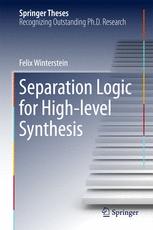

Most ebook files are in PDF format, so you can easily read them using various software such as Foxit Reader or directly on the Google Chrome browser.
Some ebook files are released by publishers in other formats such as .awz, .mobi, .epub, .fb2, etc. You may need to install specific software to read these formats on mobile/PC, such as Calibre.
Please read the tutorial at this link: https://ebookbell.com/faq
We offer FREE conversion to the popular formats you request; however, this may take some time. Therefore, right after payment, please email us, and we will try to provide the service as quickly as possible.
For some exceptional file formats or broken links (if any), please refrain from opening any disputes. Instead, email us first, and we will try to assist within a maximum of 6 hours.
EbookBell Team

4.0
16 reviewsThis book presents novel compiler techniques, which combine a rigorous mathematical framework, novel program analyses and digital hardware design to advance current high-level synthesis tools and extend their scope beyond the industrial ‘state of the art’. Implementing computation on customised digital hardware plays an increasingly important role in the quest for energy-efficient high-performance computing. Field-programmable gate arrays (FPGAs) gain efficiency by encoding the computing task into the chip’s physical circuitry and are gaining rapidly increasing importance in the processor market, especially after recent announcements of large-scale deployments in the data centre. This is driving, more than ever, the demand for higher design entry abstraction levels, such as the automatic circuit synthesis from high-level languages (high-level synthesis). The techniques in this book apply formal reasoning to high-level synthesis in the context of demonstrably practical applications.<